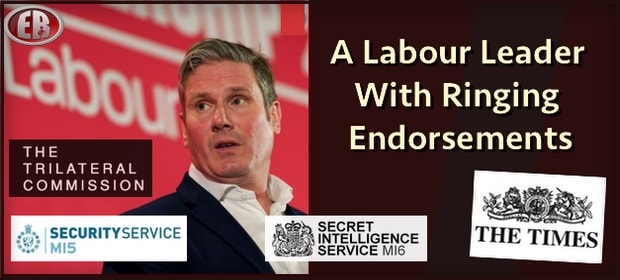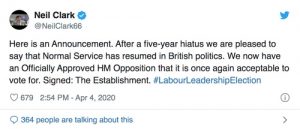
ER Editor: Neil Clark mentions this below, but we wish to draw attention to Matt Kennard’s very pointed and detailed article at Grayzone, titled Five Questions for new Labour leader Sir Keir Starmer about his UK and US national security establishment links. And Starmer is very establishment-connected indeed. As a further indicator of Starmer’s approval-rating, see this Times of Israel piece from April 2020 titled After Corbyn, UK Labour elects Keir Starmer, Zionist with Jewish wife, as leader.
We remind readers that he has replaced Jeremy Corbyn as leader of the Labour party, who was plagued by allegations of anti-semitism, accusations which were never substantiated.
************
Unstoppable rise of intel agency favourite Keir Starmer shows how UK ‘democracy’ really works
NEIL CLARK for RT
.
The investigative journalist Matt Kennard has written an open letter to the new Labour leader Sir Keir Starmer, asking five questions about his relationship to the national security establishment.

They involve meetings Starmer had with the head of the domestic security service, MI5; his membership of the intelligence-linked Trilateral Commission; his discussions with the US attorney general Eric Holder at a time when Starmer was handling the case of Julian Assange; his role in the Assange case as the public prosecutor; and his relationship with the neocon Times newspaper.
The suggestion is clear: Starmer has been very close to that establishment.
No doubt some will be shocked by the information Kennard has managed to unearth, but if we consider how UK ‘democracy’ is supposed to function, it is really not too surprising. Parties are allowed to argue about the details of domestic policy, but there is meant to be no real disagreement on matters pertaining to foreign policy and national security. In other words, UK politics should be just like America’s.
For a long time, that was indeed the case.
History of bombing
It was a Labour government which took Britain into Afghanistan and Iraq in 2001 and 2003, and a Republican administration that did the same for the US. It was a Conservative government which bombed Libya in 2011 – and a Democratic one in the US. A bi-partisan approach to bombing countries: a bi-partisan approach to ‘regime-change’ ops. Elections won’t disrupt this: the more things change, the more they stay the same.
But in 2013, there was a wobble. To the horror of the endless war lobby, Labour, under Ed Miliband, voted  against bombing Syria. Two years later, even worse for Rupert Murdoch and the ‘Deep State,’ a veteran Stop the War activist called Jeremy Corbyn became Labour leader.
against bombing Syria. Two years later, even worse for Rupert Murdoch and the ‘Deep State,’ a veteran Stop the War activist called Jeremy Corbyn became Labour leader.
Corbyn’s back catalogue was decidedly problematic. He had spoken out against every Western military intervention. He was very pro-Palestinian. He didn’t like nukes. He had praised Venezuela. Worse still, Corbyn appointed as his director of strategy and communications one Seumas Milne, a former Guardian journalist well-known for his fluent denunciations of Western foreign policy.
Operation Stop Corbyn was launched. Many Corbynistas believed it was Jezza’s economic policies which provoked the onslaught, but it was where he stood, or had stood, on foreign policy issues and ‘national security,’ which meant he was in for the political equivalent of ‘Shock and Awe.’
Establishment agenda
The smart thing for Corbyn to have done would have been to go on the front foot and articulate how the national security establishment’s agenda of promoting ‘regime-change’ conflicts against secular Middle Eastern countries was actually endangering the security of British citizens.
When quizzed by Andrew Neil in 2017 about his earlier comments that NATO was a danger to world peace, the Labour leader could have mentioned how the bombardment of Libya had turned the country into a jihadist training camp on the shores of the Mediterranean – which had deadly consequences for British tourists holidaying in Tunisia in 2015.
Instead he muttered, rather tamely, that he wanted to work within NATO to ‘promote a human rights democracy.’
Short of dressing up in combat fatigues and calling for a full-scale military invasion of Syria, while waving a copy of the Times in one hand and John McCain’s memoirs in the other, Corbyn was never going to convince the national security establishment that he could be trusted to follow the neocon agenda.
His attempts to edge away from his previously espoused views didn’t work, and his acceptance of a second EU Brexit referendum policy – pushed on him by his opponents – proved disastrous.
Starmer brings relief
But as soon as he was replaced by Sir Keir Starmer, a man with a very different resume, the pressure on Labour relented.
You could feel the relief – and the joy – from pro-establishment commentators that the Labour horse was once again back in harness. If there was one tweet which summed it all up, it came from the former Conservative chancellor of the exchequer George Osborne, an uber-hawk on Syria.
“Keir Starmer’s reshuffle is impressive – the Marxist nutters are out; moderate left are in. When this crisis is eventually over, and politics is resumed, the Tories are going to find that the five years when there was no opposition and no alternative has come to an abrupt end,” Osborne wrote.
What Osborne means when he was says there was no opposition and no alternative is that there was an opposition and an alternative, but that it was ‘off-limits.’ ‘Democracy’ in this elite, ‘Through the Looking-Glass’ model means there not really being any substantive difference between the parties on the things that really matter. If we have achieved this, then we can get back to ‘proper’ opposition; in other words, an opposition that is properly controlled.
It’s important to understand that the dictates of this ‘democracy’ mean that it’s not just Labour which has to toe the line on foreign policy, but any potential party of government. Consider how the SNP has ditched its anti-militarist tradition in order to become ‘acceptable’ as a governing party in the UK, ending its 30-year-old opposition to NATO in 2012.
 Say what you like about him, but Tony Blair knew how it works. In July 1995, the new Labour leader made a bee-line for Rupert Murdoch. Result: the Sun backed Labour in 1997, 2001 and 2005. ‘New’ Labour won in 1997, 2001 and 2005.
Say what you like about him, but Tony Blair knew how it works. In July 1995, the new Labour leader made a bee-line for Rupert Murdoch. Result: the Sun backed Labour in 1997, 2001 and 2005. ‘New’ Labour won in 1997, 2001 and 2005.
New Labour also bombed Yugoslavia in 1999, invaded Afghanistan in 2001, and Iraq in 2003. Blair could be trusted to follow the agenda. Corbyn could not.
The great Edwardian comic writer Saki put it best in the short story ‘The Comments of Moung Ka,’ when he wrote that Britain is ‘what is called a democracy.’ But that doesn’t mean that it really is one, despite the advent of universal suffrage.
************
Original article

••••
The Liberty Beacon Project is now expanding at a near exponential rate, and for this we are grateful and excited! But we must also be practical. For 7 years we have not asked for any donations, and have built this project with our own funds as we grew. We are now experiencing ever increasing growing pains due to the large number of websites and projects we represent. So we have just installed donation buttons on our websites and ask that you consider this when you visit them. Nothing is too small. We thank you for all your support and your considerations … (TLB)
••••
Comment Policy: As a privately owned web site, we reserve the right to remove comments that contain spam, advertising, vulgarity, threats of violence, racism, or personal/abusive attacks on other users. This also applies to trolling, the use of more than one alias, or just intentional mischief. Enforcement of this policy is at the discretion of this websites administrators. Repeat offenders may be blocked or permanently banned without prior warning.
••••
Disclaimer: TLB websites contain copyrighted material the use of which has not always been specifically authorized by the copyright owner. We are making such material available to our readers under the provisions of “fair use” in an effort to advance a better understanding of political, health, economic and social issues. The material on this site is distributed without profit to those who have expressed a prior interest in receiving it for research and educational purposes. If you wish to use copyrighted material for purposes other than “fair use” you must request permission from the copyright owner.
••••
Disclaimer: The information and opinions shared are for informational purposes only including, but not limited to, text, graphics, images and other material are not intended as medical advice or instruction. Nothing mentioned is intended to be a substitute for professional medical advice, diagnosis or treatment.






